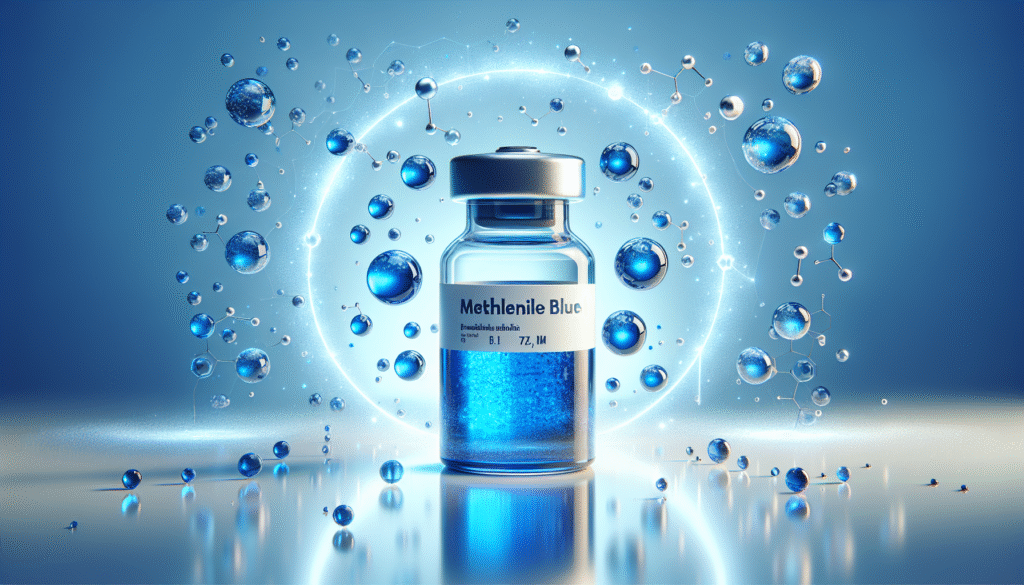
What if a single compound could offer you profound benefits for your health, particularly in terms of antioxidant support? Methylene blue, a compound with a rich history in medicine, has drawn attention in recent years for its potential roles beyond traditional uses. This overview seeks to provide you with a comprehensive understanding of methylene blue, its antioxidant properties, and its implications for your well-being.

The History of Methylene Blue
Methylene blue is not a modern invention; it has a storied past dating back to the 19th century. Initially developed as a dye, it soon found applications in medicine. You may find it intriguing to know that it was used as a treatment for malaria and later as an antiseptic. Over the years, researchers uncovered its multifaceted benefits, including its antioxidant properties.
Early Uses in Medicine
Historically, methylene blue was administered to patients for a variety of conditions. Its antiseptic qualities made it valuable in treating infections. It was also a crucial component in regimens for malaria due to its ability to combat the Plasmodium parasite. These applications laid the groundwork for its subsequent research into other health benefits, including antioxidant support.
The Modern Re-Emergence
In recent years, methylene blue has undergone a resurgence in interest as scientists explore its potential for neuroprotective effects, mitochondrial support, and its capabilities as an antioxidant. Its ability to scavenge free radicals has become a topic of discussion in the health community, prompting you to consider its broader applications in your own life.
What Are Antioxidants?
Antioxidants are no strangers to modern health discussions. You have likely encountered this term in various contexts—from dietary supplements, fruits, vegetables, and skincare products. But what are they, and why are they essential?
The Role of Free Radicals
Free radicals are unstable molecules generated during normal metabolic processes or in response to environmental stressors like pollution and UV radiation. While your body can produce antioxidants naturally, the overwhelming amount of free radicals can lead to oxidative stress, contributing to cellular damage and a range of diseases.
The Importance of Antioxidant Support
Antioxidant support is crucial for mitigating the effects of oxidative stress. By neutralizing free radicals, antioxidants play a pivotal role in reducing inflammation, protecting cells, and maintaining overall health. Incorporating antioxidant-rich compounds like methylene blue into your routine may enhance your body’s ability to combat oxidative stress.
Methylene Blue: Mechanism of Action
Understanding how methylene blue works at a molecular level can help you appreciate its potential health benefits. It has several mechanisms that contribute to its antioxidant properties.
Electron Transport Chain Interaction
One of the primary ways in which methylene blue acts is through its interaction with the electron transport chain within mitochondria. It can accept and donate electrons, effectively bypassing mitochondrial dysfunction. This process not only promotes ATP production but also aids in reducing oxidative stress.
Scavenging Free Radicals
Methylene blue is known for its ability to scavenge free radicals. By neutralizing these harmful molecules, it helps to prevent cellular damage, thereby supporting overall health. This characteristic is particularly relevant in the context of neurodegenerative diseases, where oxidative stress plays a significant role.
Health Benefits of Methylene Blue
Methylene blue presents an array of health benefits, particularly when it comes to oxidative stress and overall cellular health.
Neuroprotective Effects
Research suggests that methylene blue may promote cognitive function and provide neuroprotective effects. It has been studied for its potential in treating conditions like Alzheimer’s and Parkinson’s disease, where oxidative stress is prevalent. By combating oxidative damage in neurons, methylene blue could play a vital role in maintaining cognitive health.
Support for Mitochondrial Function
Your mitochondria are often referred to as the powerhouses of your cells, responsible for producing energy. Dysfunctional mitochondria can contribute to various diseases, making mitochondrial support crucial. Methylene blue can enhance mitochondrial function and efficiency, thus ensuring optimal energy production and reduced oxidative damage.
Cardiovascular Health
Methylene blue may also contribute positively to cardiovascular health. By improving endothelial function and reducing oxidative stress, it may help in maintaining healthy blood vessels. Additionally, its role in enhancing nitric oxide production can promote better circulation and cardiovascular function.
Anti-Aging Properties
The quest for longevity often involves looking for compounds that can mitigate the effects of aging. Methylene blue’s antioxidant properties could play a role here by helping to reduce the markers of oxidative damage, potentially slowing down the aging process at the cellular level.

Potential Side Effects and Safety Considerations
While the benefits of methylene blue are promising, you must be aware of potential side effects and safety considerations. Understanding the nuances of this compound will help you make informed decisions.
Possible Side Effects
Methylene blue is generally considered safe when used appropriately. Nevertheless, some individuals may experience side effects, such as:
- Headaches
- Nausea
- Insomnia
- Skin discoloration
Should you choose to incorporate methylene blue into your regimen, it is crucial to monitor your body’s response and consult with a healthcare professional if any adverse effects occur.
Drug Interactions
Be cautious about drug interactions. Methylene blue can affect the efficacy of certain medications, particularly those that influence serotonin levels, such as antidepressants. It may also interact with medications that require hepatic metabolism. Always discuss your current medication regimen with a healthcare professional before starting methylene blue.
How to Use Methylene Blue
If you decide to incorporate methylene blue into your health routine, understanding how to use it effectively is vital.
Dosage
The appropriate dosage of methylene blue can vary depending on your health goals and the form used. Typical dosages range from 0.5 to 2 mg/kg of body weight, but consulting with a healthcare professional is essential to determine the right amount for you.
Forms of Methylene Blue
Methylene blue is available in various forms, including:
- Tablets: Often used for supplementation.
- Injectables: Typically used in clinical settings.
- Topical applications: Useful for specific skin conditions.
Choosing the right form will depend on your goals and the advice of a healthcare professional.
Considerations for Use
When using methylene blue, it’s important to consider the following:
- Quality of the Product: Ensure you procure methylene blue from reputable sources to avoid contamination and ensure purity.
- Monitoring Symptoms: Keep track of how methylene blue affects you, noting any changes in symptoms or side effects.
- Consultation with a Professional: Before beginning any new supplement, especially one with potent effects, consulting with a healthcare provider is a prudent approach.
Research and Studies on Methylene Blue
The body of research surrounding methylene blue continues to grow, revealing its potential uses and benefits.
Clinical Trials
Numerous clinical trials have investigated methylene blue’s efficacy in treating various conditions, including neurodegenerative diseases, disorders of mitochondrial function, and even certain types of cancer. These studies underscore its versatility as a therapeutic agent.
Recent Findings
Emerging research highlights methylene blue’s antioxidant capabilities, contributing to its neuroprotective effects and supporting mitochondrial function. As studies continue to unfold, your understanding of this compound will deepen, allowing you to make informed choices about its use.
Conclusion
Methylene blue represents a fascinating intersection of traditional medicine and modern research, particularly regarding antioxidant support. Its ability to combat oxidative stress, support mitochondrial function, and potentially enhance cognitive health positions it as a valuable compound in the quest for optimal health.
As you consider the implications of incorporating methylene blue into your health regimen, reflecting on the balance of potential benefits against safety considerations is essential. Scientific exploration into the properties of methylene blue is ongoing, and keeping abreast of new findings will enable you to make knowledgeable health decisions.
In the end, your health journey is personal, and cultivating an understanding of the tools available to you—like methylene blue—will empower you to optimize your well-being for years to come.